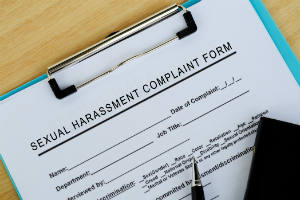 A PEO like FrankCrum can help you prevent sexual harassment in the workplace by helping you create a sound sexual harassment policy, keeping you up to date on changes in regulations with regular webinar trainings and providing you with guidance on investigating complaints and interviewing employees.
A PEO like FrankCrum can help you prevent sexual harassment in the workplace by helping you create a sound sexual harassment policy, keeping you up to date on changes in regulations with regular webinar trainings and providing you with guidance on investigating complaints and interviewing employees.
Anti-Harassment Policy
An effective policy will include a zero tolerance statement and reporting procedures. Those procedures should specify at least two people with whom an employee can file a complaint.
FrankCrum recommends the following things be included in the implementation of an anti-harassment policy.
- Provide every employee, at the time of hire, with a copy of the company’s anti-harassment policy, preferably as part of the employee handbook.
- Ensure that each employee signs a statement indicating he or she understands and will abide by the company’s anti-harassment policy. Save it in the employee’s personnel file.
- Provide periodic refresher training on anti-harassment and anti-retaliation policies along with examples of sexual harassment with all employees and supervisors.
- Review the company’s anti-harassment policy once a year (at a minimum).
- Enforce the company’s anti-harassment policy by investigating all complaints promptly and thoroughly.
- Take corrective action when it is believed that harassment has occurred to ensure it doesn’t happen again.
Investigation Guidance
If you have a sexual harassment investigation on your hands and aren’t sure of the process, we’re here to help. Our FrankAdvice support team provides forms and best practices for conducting workplace investigations and interviews. We can also help you stay in compliance with state and federal laws by communicating changes in Equal Employment Opportunity Commission (EEOC) and other agency regulations.
FrankAdvice’s FAQ (and Answers) About Sexual Harassment in the Workplace
- We are a small company, just starting out, and I don’t have an HR department. I only have one supervisor with whom the employees could potentially make a claim. What should I do?
- My receptionist feels the driver of a delivery company is harassing her. Do I have to do anything about it since the harasser is not my employee?
Yes, your company is responsible for having a workplace that is free from harassment. That includes harassment from vendors, customers or any other third parties. We recommend you contact the delivery company and let them know of the alleged harassment.
- Is it automatically considered sexual harassment if one employee asks another employee out on a date?
If the employee asks in a polite way without any sexual propositions or anything the other employee might consider inappropriate, then it’s likely not unlawful harassment. However, if the employee who’s asking is turned down and continues to ask, this could be considered unlawful harassment.
- If an employee claims he or she is being harassed, should I ask the employee to submit the complaint in writing or via email so they don’t change the story later on?
Many companies have policies requiring employees to submit complaints in writing. However, this could create a challenging situation if the employee is too embarrassed or scared to write out the complaint. In the court’s eyes, a verbal complaint is just as valid as a written one. If this is the case, you, as the employer, should document the employee’s account, ask them to review it for accuracy and sign it.
- What happens if the alleged harasser is a manager that is vital to a department? Can we transfer the accuser who is an entry-level employee to another department?
No. If you alter the accuser’s position in any way, he or she could construe it as retaliation. If you have to move someone to separate the two parties from each other, the manager should be the one you choose. Depending on the nature of your business, perhaps scheduling the manager to work an alternate shift could be a better solution.
Do you have additional questions about how to protect yourself and your employees? Be sure to check out our webinar on sexual harassment in the workplace.
Partnering with FrankCrum grants you access to a team of HR experts. If you have questions about any HR-related issues, call 1-866-697-6576.



.png)

